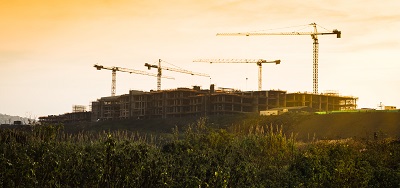Durbans Development - Bridge City moving closer to mixed-use vision
The Bridge City development north of Durban is gaining momentum as a new urban centre within a polycentric metro - increasing density, creating a mix of uses and linking adjacent areas to each other and the wider metropolitan region. With bulk infrastructure - particularly transport nodes - already operational, the development of the town centre is moving apace.

Founded on the existing rail service (rail station located under the Bridge City shopping centre) and the Bus Rapid Transport (BRT) routes currently being built between Bridge City and Pinetown and planned for between Bridge City and the Durban CBD and Cornubia/ Umhlanga, the development is attracting increasing interest as a decentralized residential/ commercial town centre hub and industrial/ business estate, both able to accommodate growing demand.
This demand for mixed use facilities has been demonstrated by the eThekwini Municipality recently acquiring development rights over five town centre sites that have been identified for social housing opportunities. This is one further piece of the puzzle that builds on the collaboration between the city and Tongaat Hulett to establish Bridge City as a fully functional, mixed use town centre able to meet the region’s current and growing needs.
The social housing plans are an essential component of this vision, building on the 48,000m2 Bridge City shopping centre and the regional magistrate’s court, which are already operational, and the 500-bed regional state hospital, which under construction and scheduled to open in 2019. In addition to the state hospital, construction on a 150-bed private hospital and nursing home will commence shortly, while enquiries for further residential, office and destination retail facilities are being processed.
“The whole picture of what we envisioned for Bridge City is now coming together with the development of key sites within the town centre,” says Brian Ive, the joint venture’s Development Executive responsible for Bridge City. “Our plans for a functional mixed-use development that combines public sector sites and services and excellent public transport with private sector investment is now almost complete.”
With only a third of the town centre site area - equating to around 91,000m2 - still available to developers, competition to take advantage of Bridge City’s unique opportunities is expected to be tight. The scheduled completion of the BRT infrastructure in March 2017 is further amplifying this demand.
Ive says the remaining sites available for development include a maximum of 300,000m2 of bulk which includes residential use and up to 118,000m2 of retail and commercial use.
“We have seen strong interest in the potential for the town centre to attract commuters, consumers and residents in a secure and clean urban environment,” he says.
Alongside established developers, the development’s potential has been recognized by local kwaMashu-based developers who recently bought the rights to develop a six-storey mixed use building, which also includes a petrol filling station.
“This latest sale epitomises the vision for the town centre. Ideally, we would like to see retail space on the ground floor and then three to six storeys of residential, office or other urban uses above that. Bridge City is attracting a mix of affordable and conventional residential, which could be maximised on those sites that have approval to develop as many as nine storeys.”
Ive adds that Bridge City represents one of the most affordable fully serviced property development products on the market, while offering exceptional accessibility and convenience in a managed precinct.
“We have invested in this development together with the city because we believe it’s the right thing to do in the right place and at the right time, and we’re actively seeking developers and end users who share this vision and are able to deliver products that meet the goal of a truly integrative mixed use development that represents the vision of a new urban future for South Africa.”
A selection of photographs are available, kindly contact Shirley if you would like additional images.
Issued by: Tongaat Hulett

KEY CONTACTS
Shirley Williams Communications: Shirley Williams
Telephone: 031 564 7700 or 083 303 1663
Tongaat Hulett Developments: Brian Ive, Development Executive
Telephone: 031 560 1900
About Tongaat Hulett
Tongaat Hulett is an agriculture and agri-processing business, focusing on the complementary feedstocks of sugarcane and maize. Its on-going activities in agriculture have resulted in the company having a substantial land portfolio within the primary growth corridors of KwaZulu-Natal with strong policy support for conversion at the appropriate time. A core element of Tongaat Hulett’s strategic vision is to maximise the value generated from the conversion of land in the portfolio by responding to key demand drivers and identifying its optimal end use for all stakeholders.
Through its sugar and starch operations, Tongaat Hulett produces a range of refined carbohydrate products from sugarcane and maize, with a number of products being interchangeable. Global sweetener markets continue to be dynamic and the business seeks to optimise its various market positions, leveraging off its current base to maximise revenue from these products. The business’s sugar operations are well placed to benefit from evolving dynamics of renewable electricity and ethanol in South Africa, and the Southern African Development Community (SADC) region. Tongaat Hulett continues to focus on value creation for all stakeholders through an all-inclusive approach to growth and development and regards its constructive interfaces with governments and society to be of significant importance.






